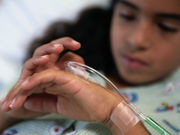Findings among children with cystic fibrosis treated either inpatient, outpatient
TUESDAY, April 4, 2017 (HealthDay News) — New antibiotic therapy, especially inpatient treatment, is associated with greater likelihood of recovery after acute lung function decline in children with cystic fibrosis, according to a study published online March 21 in the Annals of the American Thoracic Society.
Wayne J. Morgan, M.D., from the University of Arizona in Tucson, and colleagues used data from the Epidemiologic Study of Cystic Fibrosis to identify episodes of forced expiratory volume in one second (FEV1) decline (≥10 percent from baseline; 9,875 patients) and determine if antibiotic treatment was associated with recovery to baseline, or near baseline.
The researchers found that new antibiotic treatment was associated with an increased likelihood of recovery to 90 percent of baseline (P < 0.001), especially for hospitalization compared to no new antibiotic (odds ratio, 2.79). All four outpatient treatments (home intravenous antibiotic, inhaled antibiotic, oral quinolone antibiotic, or other oral antibiotic) were associated with greater likelihood of recovery compared to no treatment (odds ratios, 1.27 to 1.64); however, inpatient treatment was better than outpatient treatments (odds ratio, 1.94).
“Benefits extend across all disease stages and are especially important in patients with high lung function, who are at greatest risk for FEV1 decline,” the authors write.
Several authors report financial ties to Genentech, which funded the study.
Copyright © 2017 HealthDay. All rights reserved.








